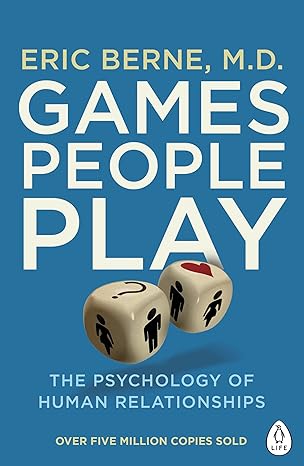I came across the book Games People Play by Eric Berne during my a conversation with my coach. This classic work delves into the subtle and unconscious “games” we play in our social interactions. Berne masterfully explores the psychological dynamics underlying these interactions, offering readers profound insights into their motivations, relationships, and conflicts.
At its core, Eric Berne defines games as recurring patterns of behavior that involve ulterior motives and outcomes. These are not playful activities but rather interactions that follow predictable scripts, often driven by hidden psychological needs. By identifying and understanding these games, we can foster more authentic and productive relationships.
The Structure of Games
Berne categorizes games based on their psychological and social functions, outlining their three key components:
- The Social Mask: The public-facing behavior we exhibit.
- The Psychological Payoff: The hidden emotional reward we seek.
- The Outcome: The predictable conclusion of the interaction.
Each game has a title, a script, and players who unconsciously follow their roles.
The Thesaurus of Games
Eric Berne provides a “thesaurus” of games, classifying them into categories that reflect different aspects of life and relationships:
- Life Games: These include games like “Why Don’t You—Yes But,” where individuals seek validation for their problems but reject solutions offered by others.
- Marital Games: Examples include “Frigid Woman” or “If It Weren’t for You,” where partners engage in blame or avoidance to sustain underlying conflicts.
- Party Games: Social interactions like “Ain’t It Awful” focus on collective complaining to build camaraderie while avoiding deeper connections.
- Sexual Games: Games like “Rapo” involve flirtation and seduction with no intention of following through, often to assert control or boost ego.
- Underworld Games: These encompass manipulative behaviors seen in criminal or subversive environments, such as “Cops and Robbers.”
- Consulting Room Games: Played in therapeutic settings, such as “Psychiatry” or “Wooden Leg,” where patients avoid personal responsibility.
Each category reflects specific human needs, fears, or desires, offering profound insights into why we behave the way we do.
Examples of Popular Games
- “Why Don’t You—Yes But”: A problem-solving game where one person seeks advice but dismisses every suggestion, reinforcing their sense of hopelessness.
- “Now I’ve Got You, You Son of a B**”**: A confrontational game where someone exploits a minor mistake to assert dominance.
- “See What You Made Me Do”: Shifting blame to others to avoid accountability.
The Path to Authenticity
Berne’s goal is not to judge but to help us recognize these patterns and move beyond them. To foster healthier relationships and personal growth, he suggests cultivating three key qualities:
- Awareness: Developing the ability to recognize games in real-time, identifying their patterns and triggers.
- Spontaneity: Encouraging authentic reactions and behavior instead of following pre-scripted roles.
- Intimacy: Building deeper connections by expressing genuine emotions and fostering mutual trust.
By shedding light on these patterns and adopting these principles, we can communicate more openly, build trust, and address underlying insecurities and needs.
Games People Play by Eric Berne is a groundbreaking exploration of human psychology and interaction. By categorizing and analyzing the “games” embedded in daily life, Eric Berne equips us with tools to navigate relationships with greater self-awareness and authenticity. Whether in life, marriage, social settings, or even therapy, understanding these dynamics can lead to richer and more fulfilling connections. This book is a must-read for anyone eager to uncover the hidden scripts that shape our interactions.
